#which of course comes back with his companion quest but its a nice contrast to see how
Explore tagged Tumblr posts
Text
also looking at character conflict with eder specifically. i love that he just kind of (somewhat understandably) sucks when it comes to how he interacts with xoti, since he's the first companion that we meet and he's charming and amicable with the watcher, then you see him interact with xoti and it's a nice reminder that he has problems and he kind of sucks sometimes at interpersonal relationships.
#which of course comes back with his companion quest but its a nice contrast to see how#he interacts with the watcher vs like nearly everyone else#obviously xoti is on the more extreme end of this#whereas with most other characters its him putting his foot in his mouth#or frustrating people#but still its nice that he's both kind and charming and also kind of an ass#text
21 notes
·
View notes
Text
Top 10 Open World Games for Android and IOS
Open world games are those games in which the player can freely move around the map, explore the world, and use all the opportunities provided by the game. Often these are also sandbox games in which the player himself determines the purpose of the game. Also often these are plot-driven games in which you can independently choose the order of completing quests. Such games are usually contrasted with linear games, where you can only go to a certain location and complete quests in the strictly specified order. Players value open-world games for freedom of choice and a greater sense of reality. In this list you will find a variety of open-world games on Android and IOS which you can enjoy offline and not only at home.
Oceanhorn 2: Knights of the Lost Realm
Oceanhorn 2: Knights of the Lost Realm is an open-world adventure game inspired by The Legend of Zelda game series. As in many RPG games our hero unexpectedly gets involved in the conflict and decides to become a knight in order to fight evil creatures and protect the weak. In this he will be assisted by his companions. The plot of the game is largely revealed through the dialogue of the protagonist with NPC characters. The game has many interesting puzzles and side quests for which you can get good bonuses and upgrades. Separately we want to note the very nice cartoon graphics of the game.
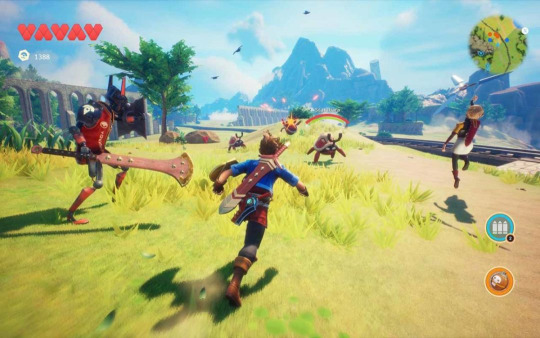
Minecraft PE
Minecraft hardly needs an introduction. Even people who are completely uninterested in games have heard of this game. And yet, recall that in this game you can try to survive by running away from aggressive mobs, building fortresses, and getting food in survival mode. Or you can just enjoy exploring an open and almost endless world and building something from countless blocks in creative mode. Relatively recently this favorite game of millions has become available on mobile devices.

Portal Knights
According to the plot of Portal Nights, the enemies destroyed the world and only a lot of isolated islands remained from it. You can only move between these islands with the help of secret portals. Thanks to the procedurally generated infinite world, players do not know what awaits them for each new portal. Find all the portals and unite the pre-existing world. You can play as a mage, ranger or warrior. And to explore the world and fight monsters was more fun, you can play the game with friends (up to 4 people).

Galaxy on Fire 2
In this exciting game you will play as cosmonaut Keith Maxwell. Pirates attacked his spaceship and an accident occurred due to which he woke up on the other side of the galaxy after 35 Earth years. Of course, Keith really misses the house. He dreams of building a powerful spaceship that will bring him back. To do this, he first needs to earn a lot of money. You have to carry out many tasks of aliens from collecting valuable resources to protecting the universe from villains.
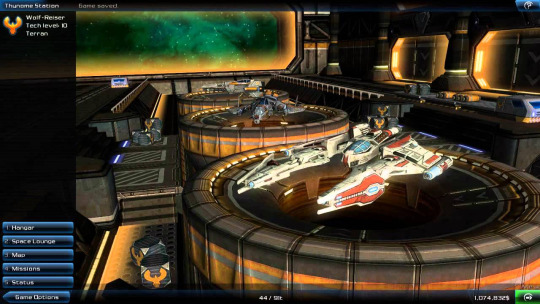
Mines of Mars
Mines of Mars is an exciting arcade game that combines the features of Minecraft and Metroid. You will need to explore the abandoned mines of Mars constantly bumping into crowds of hostile aliens. Fight with them, get valuable resources, and create modern weapons. You will appreciate this game for its thoughtful plot, nice 2D graphics, complex boss battles, and, of course, wide prospects for exploring the open world.

GTA: San Andreas
The plot of the world-famous crime action begins with the main character Carl Johnson deciding to return to his hometown of Los Santos in the early ‘90s. Immediately after Karl’s arrival the policemen decided to set him up, accusing him of killing their colleague. To protect himself and his loved ones, the main character is forced to seek help from his old friends engaged in crime. Millions of players love this game for the ability to perform various actions that are prohibited or inaccessible in real life: steal cars, kill people, hide from the police, fly a helicopter, create their own gangs, and much more. This perfectly relieves the stress of everyday life.

Baldur's Gate II: Enhanced Edition
Baldur's Gate II: Enhanced Edition is a game made based on the once-popular D&D board games. According to the plot of the game the main character lived in Candlekeep fortress with his father. It seemed to them that they were absolutely safe. But everything changed when hired killers entered the fortress. The boy had to leave his native home and participate in a bloody war between Baldur’s Gate and Amn. The game strikes with an exciting plot, the presence of more than 40 classes, more than 150 game items, and more than 100 spells.

Escapist 2
The Escapists 2 is a jailbreak strategy game with cute Minecraft-inspired pixel graphics. Your character will need to explore the prison to find things that can help them escape, interact with other prisoners, and try to keep up with the prison schedule so as not to arouse suspicion. The game has many creative ways to escape, and at the same time you will need to come up with the right one in your situation. For example, you can change into a security guard, climb through a sewer, dig an underground tunnel, or climb into the box for transportation.

Realmcraft
Realmcraft can be considered one of the most successful free alternatives to Minecraft. Therefore, if you are a little fed up with Minecraft but still want something like that, then you can try this game. If you choose the survival mode, then you will need to hurry up to make at least a simple shelter before zombies and skeletons come out from all sides. But if you want to play a relaxing game, just select the creative mode and build from different blocks whatever you want.
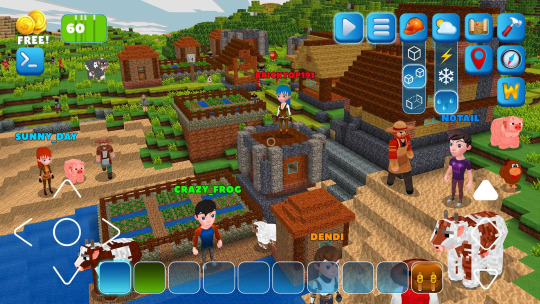
Godus
Godus is a game in the genre of God Simulator, created by the director of the cult games Populous and Black & White, Peter Molyneux. In the game you control mainly nature. You can make the village as suitable as possible for farmers, and you can come off to the fullest, sending various natural disasters to people. But it’s more interesting to develop your civilization from cavemen to high technology, increasing the number of your believers.
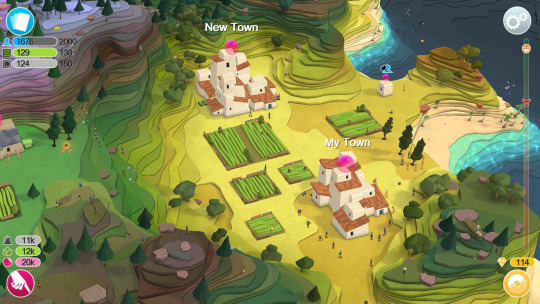
3 notes
·
View notes
Text
Assorted Thoughts on The Dragon Prince Season Two
Hey, guys. Spaceman here, and… *sigh* …fine.
Since I reviewed season one of Netflix’s The Dragon Prince last week, I suppose I should talk about season two, which premiered last Friday. But I thought I already told you guys, The Dragon Prince… just doesn’t do much do much for me. Don’t get me wrong; season one wasn’t bad or anything, but it just kind of felt standard and a bit meh, so it was hard to get too excited for the second season, and I’m not going in expecting much—
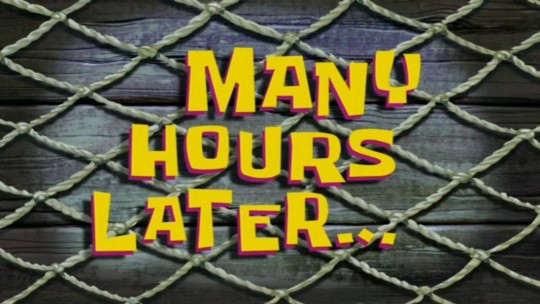
HOLY SH—okay, wow, um… so, The Dragon Prince season two is actually kind of awesome, so… just… completely disregard everything I said in that last paragraph, because jeezus, I was wrong as hell. Seriously, this season is legit! Nearly every problem I had with season one is rectified in season two, all while still remaining subversive to my expectations. Let’s get into it!

The Animation
Okay, the first big, kind of obvious thing I have to talk about is the animation. That was one of the most criticized aspects of season one, the CGI, semi-2D look that just felt choppy in a lot of places, and I was super critical of it myself. Well, I have to hand it to Wonderstorm, because they really pull through on season two. It looks much smoother and more professional and doesn’t pull me out of the moment as it did in season one. Series creator Aaron Ehasz said in interviews that the animation would be more smoothed out, and I’m glad to hear that those words weren’t just hollow. It seems that the crew behind this show are willing to listen to criticism.
The Characters
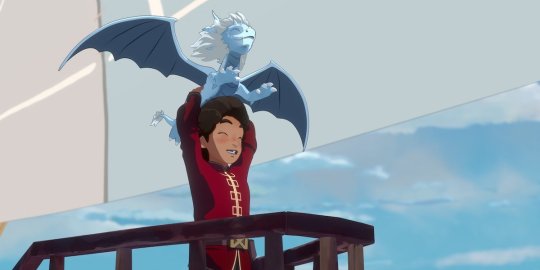
I already talked about the main characters in my review of season one, so I don’t feel the need to talk much about them, since I don’t want to go into major spoiler territory just yet. With maybe one exception: Ezran. I criticized his character as feeling flat in season one, but he actually improves quite a great deal in season two. It’s nice seeing him form a bond with the baby dragon, Azymondias, and how it takes a toll on Bait, his animal companion from season one, who feels neglected. Also, his reaction when he discovers that his father had died seems… very believable. With little time dedicated to it and few words spoken, he goes through the entire spectrum of emotions upon discovering this: denial, anger, bargaining, depression, and then acceptance. His acceptance ties in with a very important decision he makes in the last episode of the series, though I’ll get to that in the spoiler section.

Among the characters from season one I neglected to talk about are Ellis and her pet wolf, Ava. They only appear for the first three episodes of season two, but I liked them well enough and they do help out our main characters a great deal. I also like Lujanne, the Guardian of the Moon Nexus. It’s nice to see other elf characters, since we have yet to actually arrive in Xadia, and she’s funny in the kooky kind of way; it’s pretty clear that spending years alone protecting the Moon Nexus has made her go a bit off the deep end.
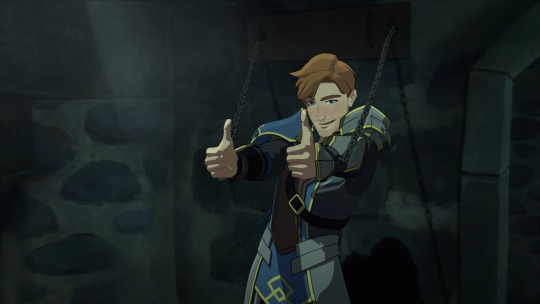
Some of the more notable characters include Gren, who always seems to maintain a cheerful attitude even when things are going wrong—I remember him saying, “Why see myself as chained down, when I can see my self as chained up?” which was a pretty funny moment—and Captain Villads, the blind narcoleptic pirate who Rayla and the princes hitch a ride with.

Hey, I just realized, I’ve been talking about the characters in The Dragon Prince and somehow neglected to mention the dragon prince himself! Azymondias, nicknamed Zym, is the hatchling from the dragon egg last season and he is adorable. Even Claudia seems to think so!
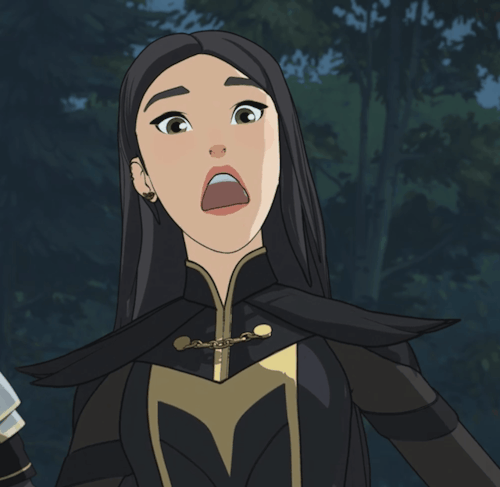
But okay, time for a full review of the plot. It goes without saying that there will be spoilers, so unless you have seen the new season, read at your own risk.
Spoiler Discussion
I was a little shocked, first off, that this show only takes place a day or so after the first season’s finale. I figured there would be a time skip or something, but no. That said, the story in season two is executed amazingly. First off, the big question from last season was how Ezran and Callum would react when finding out that the elves offed King Harrow. Well, surprisingly, neither one went with the reaction I was expecting. I was afraid that we would go through the clichéd path of “Oh no, what if Callum and Ezran got angry at Rayla because of what the other elves did?” which we all knew would end with them forgiving her, of course. But no, they avoided that trope altogether. Callum’s big struggle was how he was going to tell Ezran the truth without breaking him. Similarly, Ezran’s first thought was whether Callum knew, which was followed by him going on a long walk by himself and talking to Claudia about it. This is when he makes the decision to leave Ezran, Callum, and Zym—yes, leave the Dragon Prince whom he has developed a connection with—and return to Katolis to take over the throne for his late father. This is a major twist and something that nobody was expecting, but I honestly quite enjoy how it was handled.

It was great seeing all the new locations and characters. Possibly the most interesting one was Duren, led by its young ruler, Queen Aanya. This girl delivers some serious verbal blows to Viren and it’s just amazing to see. But also, finding out about her kingdom was really damn cool. We learn about her parents, the Queens of Duren—you heard right—and how Katolis assisted them in a quest to bring food for both kingdoms when they were starving during the winter.
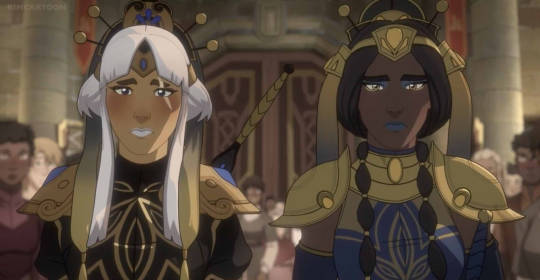
I’m glad to see more LGBT+ characters in animated shows, and while a lot of people criticized it for the Queens’ death, it doesn’t seem too bad to me. They’re treated like heroes, and we knew of their fate beforehand, so it’s not like it was playing their deaths for shock value—hell, they died in the same battle that took the life of Queen Sarai, Callum and Ezran’s mother. Besides, the creators promised before that there would be more LGBT+ characters as the series progresses… and hey, they promised that season two would have better animation, which it did, so I don’t see any reason not to trust them.
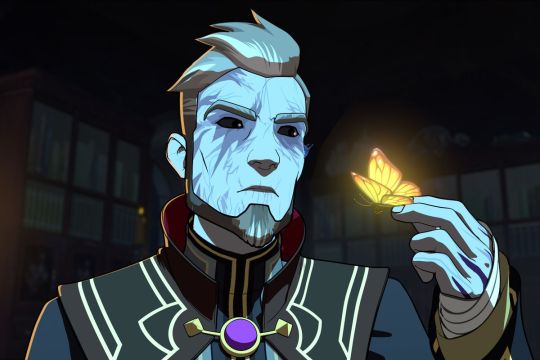
Viren was also a nice touch. Like the first season, he comes off as an antagonist but still has his human moments, where he doesn’t seem like he was simply manipulating people for his own benefit. One of the best moments in the show is when Viren tells Aanya the story of her parents’ heroism; this is contrasted with a scene of Callum reading a letter from Harrow telling about his mother. In many of the flashbacks, we see Viren helping Katolis and standing by Harrow’s side, and it shows that he and Harrow truly were friends before Viren’s love of dark magic took over. It’s also revealed later that Viren had a wife, the mother of Soren and Claudia, but she left him. That was another interesting tidbit. You don’t often see divorce in a fantasy environment.

Speaking of baddies, let’s talk about Aaravos, the elf in the mirror. Now, I was immediately impressed with this character for his cool design, mysterious ways, and booming voice, and it seems that a lot of the Internet shares my enthusiasm! Maybe a little too much, in fact… Yes, Tumblr in particular has taken a… ahem… liking to this character, and I’ll be honest, I don’t get it. He’s cool, sure, but come on, guys. Don’t you think you’re letting your love of this fictional character go too far?

Oh, Amaya, you can crush my head between your thighs any day… what were we talking about again?

Yes, we do actually find out some stuff about Sarai here! She and Harrow had a really beautiful relationship. For one thing, it seemed like while she was alive, they ruled together, not that Harrow was the ruler and Sarai just sat around. She was a friend and top consultant to him as much as she was his wife, one half of his whole. I distinctly remember a scene where she basically tells him off, that an idea he and Viren had was a bad one, and both verbally and physically kicks his ass in the process. That was really telling of their relationship and made it all the more heart-wrenching when it shows how she died.
Another major part of this season is Callum’s quest for magic. In season one, he was using sky magic with the primal stone, but he destroyed it in an act of selflessness to hatch Zym. Here, he has once again found himself lost without any clear role in the group: he had noted before that he wasn’t a capable swordfighter and that when he was doing magic, it felt like his true calling more than anything else. He tries multiple times to connect to the primal source, even though he wasn’t born with it. However, possibly the biggest shocker was this moment:
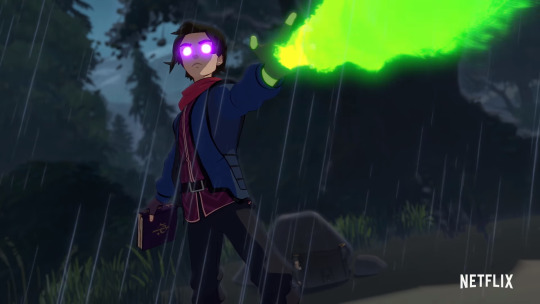
…Oh my god. Callum, what are you doing? Callum, no! Don’t use dark magic! That’s not the way! Oh god, he’s using dark magic. We’re all screwed.

Nearly as much of a shocker moment as this is when, during a battle, Soren gets flung and lands in such a way that we hear a cracking sound. You may not think too much of this, until it becomes increasingly clear that he’s not getting back up again. However, the saddest part is when he reveals that he is actually relieved that he was injured, because it means that he wouldn’t have to go through with Viren’s order for him to kill the young princes.
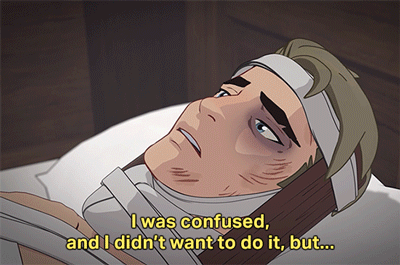
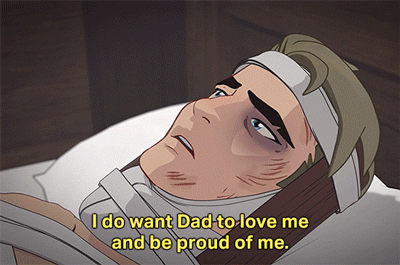
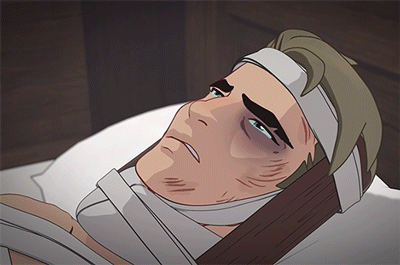
This scene, man. This damn scene was hard to watch. It really shows the humanity that every character has, exposed as they go through the story and have to be put through so much.

And then… well, no more beating around the bush. Callum and Rayla: It’s gonna happen. Like, as usual, I won’t know for certain until/unless it does actually happen, but it’s looking more and more like it. But so far, it’s been handled really well. Rayla is first angry at Callum for using dark magic in the earlier scene, but it took a physical toll on him and he becomes very ill from it. While she first tries to hide it, over the scene it looks more and more like he won’t make it and she becomes seriously concerned for him and shows that she really does care about him. It looks as though she’s about to say something to him—a confession, maybe?—right before he recovers. To be honest, the way they’re building it up, it could either turn out to be a romance or a great friendship, but it feels very natural and I’m all for it either way. And if it is the former, I’m glad they aren’t pulling the typical romance clichés in cartoons, like having Callum crush heavily on Rayla (hell, he was crushing on Claudia up until she betrayed him this season) or having Rayla act in the tsundere, “I don’t like you, idiot” kind of way. But yeah, I’d love to see where this goes.
(Don’t worry about Callum, by the way. He’s not in danger, he’s just going through a really trippy fever dream that allows him access to sky magic.)
Other Stuff
As much as I’ve talked about everything else, the humor in this season is also really on-point, much more so than the last season! I found myself laughing out loud at a lot of points. That said, some of the more reference-based humor… doesn’t exactly hold up. Like, there’s a scene where Rayla pulls an extended Sailor Moon gag, and another where Callum literally says, “One does not simply walk into Xadia,” and… this Simple Minds reference:

Because in a medieval fantasy environment, everybody has seen The Breakfast Club, right? Perhaps the only one I can get behind is this credits gag with Aaravos imitating the Gatsby pose:

Which seems much more fitting there than in the show itself, since the credits are just filled with little gags like that.
As for questions about season three, most of my questions in my last post have been answered, but it did open up a few new questions. Who is Aaravos and what is his motivation? I’m assuming he’s an antagonist, but he could easily subvert our expectations. Will returning Zym back to the dragon queen really bring an end to the war? We’re only two seasons in out of a presumed six or seven, and I figured it would take a lot longer to get to Xadia than it did, but they’re already there, so it’s going to have to be stretched out a lot further, I figure. Finally, there’s a fan theory going around that King Harrow swapped bodies with Pip, Harrow’s bird. Is there any truth to that? We saw Pip escape in this season, so it could have been, but I don’t know.
Conclusion
Season two of The Dragon Prince was an improvement on season one in every way. The show really came into its own with this season, much more so than with the first one. I loved the characters, the animation, the worldbuilding, the soundtrack, and unlike the first season, which just left me feeling meh, this one actually makes me want to see a lot more, and… yeah, I’m a fan now. Congratulations, show. As Leonardo DiCaprio put it, you had my curiosity, but now you have my attention.
Once again, I implore you: don’t screw it up. But this time, I trust that you won’t.
~Spaceman
#assorted thoughts#the dragon prince season 2#the dragon prince spoilers#the dragon prince#tdp callum#tdp rayla#tdp ezran#tdp spoilers#tdp claudia#tdp soren#tdp s2#king harrow#queen sarai#tdp amaya#general amaya#the queens of duren#tdp viren#lord viren#tdp aanya#aaravos#tdp aaravos#elf#elves#dragon#azymondias#tdp zym#tdp gren#gren tdp#captain villads#tdp ellis
5 notes
·
View notes
Text
Study Buddies. Just Study Buddies. (a Sherlolly fanfiction)
This was written for @katfevre for the Sherlolly Fic Exchange 2017.
Prompt: Sherlock and Molly at university. They keep running into each other in the library: looking for books in the same section, hiding/studying in the same secret corners. Small polite exchanges develop into longer conversations, which develop into a friendship and eventually into a snogging session in the book stacks.
Molly Hooper was a scholarship student. The only reason she was able to attend the “Doyle School for the Gifted” was her brilliant test scores. That and the abnormal love she had for anatomy at the age of 11 which had intrigued the school board and admissions staff. She had been accepted into the school at age 12 and had been going there for 5 years now. As a senior, Molly Hooper would be expected to complete a final (and impressive) research project before heading off to university. Most Doyle students could choose to go to whatever university they wanted. Molly, however, knew that her family would struggle to fund her future academic ventures and knew that she had to make this last year at Doyle count. In order to do this, Molly found herself studying in the library every day for many long hours.
William “Sherlock” Holmes was from a so called “legacy family” at Doyle. His older brother, Mycroft, had attended the school. As had his mother. His mother’s father had gone to Doyle and his father before him. The Holmes had always been students at Doyle ever since its conception. It was expected that Sherlock would not be the last Holmes to attend Doyle School. Of course, that was the opinion of the school and of the Holmes parents and ancestry. The opinion of Mycroft and Sherlock Holmes was, in fact, that they would be the last two Holmes to attend Doyle. Mycroft was not inclined to procreate anytime soon due to his extreme lack of interest in women and his abundant appreciation for the male form. Sherlock had proclaimed on more than one occasion that he found everyone, no matter their sex, far too dull to even be bothered with and that he had no intention of ever tying himself to one of them permanently. Sherlock preferred to throw himself into the quest for knowledge, useful knowledge. During his senior year at Doyle, unlike most of the teenage boys running rampant on the property, he’d spend most of his time cooped up in the dusty old library.
Doyle School for the Gifted was attended by students of all sorts. The one thing they all had in common was that they all were “gifted” in some way. Not all were the blatantly intelligent like the Holmes brothers or even Molly Hooper. Many were intelligent in certain areas, but some simply had impressive talent. Doyle employed staff of all sorts to meet every need of their students. Even their stranger needs would be met. Molly’s own small circle of friends displayed this. Molly herself did as well.
She had a therapy cat. His name was Toby. He had been a gift from her father and was the only thing that helped calm her down after a bout of her social anxiety. She was allowed to keep him in her dorm room. There were vets available to her in case he ever needed anything. If needed, she was even granted permission to carry him with her to her classes.
Then there was James Moriarty. Molly was friends with him, or at least she was friends with parts of him. She was friends with what they (their little group of friends) kind heartedly referred to as “techie Jim”, “gay Jim”, and “shy Jim”. There were probably a few other “Jims” she got along with, but those three were what she deemed Jim’s best. Jim Moriarty had a personality disorder. A multiple personality disorder aka dissociative identity disorder. Despite this apparent “setback” to Jim’s learning, he’d instantly been accepted to Doyle. Jim was beyond clever. Somehow, Doyle had gotten ahold of expert therapist and counselors to work with the Moriarty boy and attempt to help him when his darker personalities came out to play. Occasionally, they were unsuccessful and James would attempt arson or suicide, but they always found him before anything went too far.
Then there was Sebastian Moran. He was Jim’s right hand man. Sebastian would stay by Jim’s side through all the personalities. (Molly had noted more than once that “gay Jim” was the most likely to willing and excitedly stick to Sebastian side.) He himself had a few anger issues and had been called a sadist more than once. He’d been accepted to Doyle at 16, far later than most. He’d already been sued twice when caught hunting on private property. Doyle didn’t mind the criminal record.
Of course, there were also Meena and Mike who didn’t seem to have special needs of any kind.
Molly was content with her small and odd group of friends. She had no interest in pursuing new ones. The mere thought made her skin crawl.
Sherlock Holmes had no need for people. He had no friends. Well, he had one friend at Doyle. John Watson had somehow wormed his way into Sherlock’s nonexistent social circle. He had easily grabbed the title of “best friend”.
A blur of black and purple rushed into the Doyle library. It was Sherlock Holmes. His sharp, pale features were an extreme contrast from his dark hair. Already there, in a quiet and dusty corner, was Molly Hooper.
Sherlock took a seat at the opposite side of the large library from Molly. The two did not even notice each other’s presence.
The librarian at the Doyle School, a lovely older woman with a spunky attitude by the name of Martha Hudson, knew both Molly and Sherlock very well. She had not been fond of the previous Holmes students, but she thought Sherlock was an absolute dear. She had declared Molly Hooper to be “as sweet as pie” the first time they had met and her opinion of the girl had lasted. When the old grandfather clock in the library rang out that it was already midnight, Mrs.Hudson collected her things and left the library, locking the doors behind her. All the students had been gone for hours. Well, all the students but two, Molly Hooper and Sherlock Holmes. Neither student reacted as Mrs.Hudson left for the night. They had both gone through this before.
At around 2am, Molly Hooper stretched out her arms, rolling her sore shoulders. She had sat here looking over these endless documents for hours. None of it even seemed to be helpful to her research. She got up and wandered the stacks, knowing that it always helped her think. As she passed the shelves she would occasionally stop and pull out a book she thought might possibly help her project until she reached her destination. She already had five books in her hands, but knew that she must fit one more. Trying not to drop her selected tomes, she reached up, stretching her short body, and barely grasped her fingers around the desired item. A play. A Shakespearean play. Today it would be Much Ado About Nothing . Last night it had been Romeo and Juliet . Tomorrow night it might be -
Molly stopped. It was missing. Richard III was missing. Molly knew she had put it back after she’d pulled it a couple weeks ago. No one else came into the Shakespeare section. No one. At least, she didn’t think so. She had never seen anyone other than her there before.
Molly turned around, her brain preoccupied with what had happened to Richard III , and instantly knocked into something very solid. Something that should not have been there. Something that was actually a someone.
“Holy fucking hell,” Molly shouted. Her breath coming in gasps as she stared shocked at the other body. The body she was sure had no business being here at 2:30 in the morning. “You scared me half to death,” she accused him. The library was only dimly lit at this hour but she could still recognize her companion. Sherlock Holmes. Sherlock freaking Holmes.
He eyed her. “I didn’t realize you were here. The library is closed after all.”
Molly started turning red from anger (but perhaps also a bit from embarrassment. She had shouted so crudely and all her books had fell from her arms onto the ground. It made her look careless and as much as he was a prat, Sherlock Holmes was a gorgeous and frightfully intelligent prat.) She stumbled over her words as she begin, “I have, I mean, Mrs.Hudson she gave me special permission to be here after hours. Not just today. I’m here every night. She gave me a key. It was only because I explained that I needed the extra time and resources for my research. I don’t sleep anyway. She verified my insomnia with the nurse and-” Molly closed her mouth realizing she had already said too much. She was rambling. She didn’t want to ramble in front of Sherlock Holmes! Well, at least Jim had said her rambling was cute. Maybe Sherlock would think so too. Who was she kidding? Of course he wouldn’t. Wait, that’s right. Sherlock was here. What was he doing here? “What are you doing here so late - er, early?”
Sherlock stepped past her. She had not noticed the book he carried in his hand, but he slipped it back on the shelf. “Mrs.Hudson has let me stay here as long as I please since I was thirteen. I can assure you that I as well am here almost every night.”
Sherlock the turned away from her and walked out into the depths of the library, disappearing within the shelves.
“Huh,” Molly sighed. She collected her books from the floor and the turned back to the Shakespeare shelf. Richard III had returned to its rightful place. “Huh,” she repeated to herself.
The next day, Molly scoped out where Sherlock sat in the library. He spent much of his free time during the day there, just as she did. She only wasted a few hours finding his preferred spot.
That night, when Mrs.Hudson left, Molly collected her belongings and moved across the library to where Sherlock sat. She quietly placed her things down on the table next to Sherlock and sat.
He didn’t startle, but raised one perfect eyebrow at her. “What are you doing? You can’t sit with me.”
Molly smiled. “I just thought it might be nice if we spent the night together. Um, the nights here. Studying.” She was already flustered.
Sherlock rolled his eyes. “Well, you were wrong. It will not be ‘nice’.”
Molly was not about to give up.
Their first few nights together (studying! Only studying!) were filled with poor jokes on Molly’s side and contempt from Sherlock. Eventually, however, he would start to smile just a bit when she laughed at something delightfully morbid. He also began showing her his research on bees. She was instantly enthralled. He found that she made
a good research partner. Molly was more than willing to help out anyway she could. Sherlock even found himself interested in her own work on human tissue. Dead human tissue.
The days turned into weeks turned into months. Then, one night they were both there. Molly had left earlier but come back around 3am, never wanting to miss a night with Sherlock. She had gone to attend the Christmas party that Jim was secretly hosted in the dorms. She knew Sherlock wouldn’t come but had silently hoped that perhaps he would show up. She knew she looked nice. Her hair done up and her makeup a brilliant shade of red. So, when she went to see Sherlock she left herself done up. Hoping to evoke a reaction.
She did.
Sherlock found himself looking at her again and again that night. He wanted to kiss her. He’d never wanted to kiss anyone before. But Molly, Molly Hooper.
It’d just be an experiment. Sherlock said that to himself over and over. It’d just be for science’s sake.
So he kissed her.
Her lips were soft. She tasted like mint and ginger. It was positively brilliant. She was positively brilliant. Molly sighed into the kiss. This. This is what she had wanted. He was what she had wanted. Needed really.
Sherlock would never admit it, but he needed her too.
And since experiments always should have more than one trial, he kissed her again.
I'm fairly certain I hadn't posted this on tumblr yet. If I did - well, lucky tumblr gets it twice!
#sherlolly#sherlock#bbc sherlock#sherlolly fanfiction#alternate universe#fanfiction#Sherlock holmes#molly hooper
8 notes
·
View notes
Text
Game 363: Ultima VII: The Black Gate
A deceptively pleasant introductory screen.
Ultima VII: The Black Gate
United States ORIGIN Systems (developer and publisher)
Released in 1992 for DOS; 1994 for SNES
Forge of Virtue expansion released later in 1992 for DOS
Date Started: 20 March 2020
I first played Ultima VII in 1999. I had just purchased my first Windows laptop after 7 years of Mac-exclusive ownership, and I was ready to catch up on a decade of RPGs. I had staved off my addiction while serving in the Army Reserves, going to college, meeting my eventual wife, and starting my career, and it was best for all of those endeavors that I did. But life had settled down by then, and I was ready to take the risk.
The first two “new” RPGs that I played were Might and Magic VI and Ultima VII. (“New” being post-1990, when my Commodore 64 had died. By then, Ultima VII was 7 years old, of course, but I still think of it on the “new” side of the dividing line between “old” games and “new” games.) I had a similar reaction to each of them: initial distaste, followed by growing admiration, followed by absolute awe.
This may be the first CRPG with an expansion pack that takes place within the main quest.
But I still remember the reasons behind my initial reaction, and a few of them remain valid criticisms. I bought it as part of an Ultima anthology, so I would have played it after hitting Ultima IV-VI in quick succession. Compared to the small, crisp icons of the previous games, the Ultima VII characters seemed impossibly lanky and awkward. The creators must have taken to heart the criticisms of the tiny Ultima VI game window because they made the entire screen the game window–but then they zoomed it in so much that you still only see a tiny area.
They removed the ability to choose a character portrait, and I hated–still hate, really–the long blond-haired jerk that I’m forced to play. The guy looks like he’s about 50, which doesn’t bother me as much today as it did then. The typed keyword-based dialogue that I absolutely cherished had been replaced by clicking on words spoon-fed to you by the game. And then there was all the clicking! For the first time, the Ultima interface wasn’t using my beloved keyboard shortcuts but instead wanted me to click around on things. I hate that now and I hated it more then, when the mouse was still new and uncomfortable.
I still find everything about this screen annoying.
Finally, there was the plot. 200 years have passed?! And all my old companions are still alive?! Who is this Red Thanos taunting me through the computer screen? And what in Lord British’s name have they done to Lord British?!
This is all to say that I’m glad I’m not playing Ultima VII for the first time. This is a game that vastly benefits in a replay, at a point where I’ve accepted its weaknesses but also have a full understanding of its strengths. In fact, the position that I’m in right now–knowing that I’m in for a good game but not remembering much of it because I haven’t played it in maybe 13 years–is just about perfect.
So let’s back up and note all the things that the game does right, starting with the animated, voiced introduction, perfectly scored. The game opens on a pleasant scene of Britannia. A butterfly dances around a grassy hillside at the edge of a forest. There’s a lilting tune with a timbre suggesting an organ but a melody suggesting more of a flute.
The first appearance of the Guardian.
But after a few seconds, the music fades and is replaced with an ominous, themeless tune in a low register. Black and blue static fill the screen. A red face with glowing yellow eyes and teeth like rocks pushes through the screen to address the player directly:
Avatar! Know that Britannia has entered into a new age of enlightenment. Know that the time has finally come for the one true Lord of Britannia to take his place at the head of his people. Under my guidance, Britannia will flourish, and all the people shall rejoice and pay homage to their new Guardian! Know that you, too, shall knell before me, Avatar. You, too, shall soon acknowledge my authority, for I shall be your companion, your provider, and your master!
I would note that in contrast to the comically awful narrations at the beginning of both Ultima Underworld and Ultima VII: Part Two, the Guardian’s voice is reasonably well-acted by Arthur DiBianca, who I gather was just a programmer who happened to have a nice bass voice. The voice immediately gives us a paradox because the Guardian looks like an ape, an orc, a monster, yet his voice is clear, his speech intelligent and articulated. Just what kind of foe are we facing? One who knows who we are, who has the ability to push through into our world.
(Incidentally, having never played Ultima VIII or Ultima IX, I still don’t really know the answers to the questions about the Guardian’s origin and motivations. I know it’ll be tough, but I’d appreciate if no one spoils it.)
As the screen fades, the camera pulls back to show that the player is somehow playing Ultima VII on his computer, with a map of Britannia and a Moonstone sitting beside it. No, it doesn’t make sense. Don’t think about it.
I can’t not think about it. How is my character playing Ultima VII? Does he have his own character? How far down does it go?
“It has been a long time since your last visit to Britannia,” the title screen says, two years constituting “a long time” back in those heady days of annual releases. The character picks up his moonstone and heads out to the circle of stones in his back yard–only to find a moongate already there. Without hesitation, he plunges through to the title screen, which features not the triumphant, adventurous introductory music of most RPGs but rather a dark, dreadful march in 2/4 time. Something awful is coming, it says.
I’m not sure this ever gets answered.
Before we get into character creation and the opening moments of the game, let’s diverge to the manual, which is perhaps the most brilliant game manual of all time–a superlative unlikely to ever be broken now that game manuals no longer exist. It manages to educate the player on the basics of Britannia and the past Ultima games while perfectly serving the plot of the current game. It is the only manual that I know that was written by the game’s villain. I realize that’s a bit of a spoiler, but you’d have to be a particularly dense player to not realize that something is at least a little fishy with “Batlin of Britain,” and a veteran player of the Ultima series reads it with an escalating horror.
The manual is called The Book of Fellowship, and it describes the history, geography, and society of Britannia in the context of the growth of a quasi-religious/philosophical order called the Fellowship. Jimmy Maher has a particularly excellent article examining the parallels between the Fellowship and the Church of Scientology. (Garriott had apparently read a 1991 Time magazine exposé of the Church while the game was in its planning phase.) But I also see a lot of the (then-) growing “prosperity gospel” in the Fellowship, and Batlin strikes me as much of a Joel Osteen (although no one at ORIGIN would have been aware of him in 1992) as an L. Ron Hubbard. One particular analogue with prosperity theology (and not Scientology) is the organization’s “layered” approach to scripture. The Fellowship does not reject the Eight Virtues of the Avatar any more than prosperity theology rejects the Bible. It simply adds its own new layer of interpretation (simplification) on top of them, encouraging its followers to hold true to the past without really focusing on it. The emphasis is all on the new material–in the case of the Fellowship, their Triad of Inner Strength.
The manual begins with Batlin of Britain’s introduction of himself. He presents himself with false humility as just a regular man, a fellow “traveller” through life, who has happened to stumble upon a bit of wisdom that he wants to share. Throughout his biography, he brags-without-bragging that he has served in all eight of the classical Ultima roles: Born and raised by druids in Yew, a first career as a fighter in Jhelom, then as a bard in Britain; trained by a mage from Moonglow; serving for a while among a company of paladins in Trinsic and as a tinker in Minoc; and finally spending a sojourn with the rangers of Skara Brae before ending up as a humble shepherd in New Magincia. His series of portraits through these sessions show a square-jawed, hale, charismatic figure, and it’s no surprise when we actually meet him in-game to find a fatter, oilier version than is presented in the official portraits.
What kind of pretentious jackass divides his own biography into sections called “part the first” and “part the second”?
During his description of overcoming some wounds in Minoc, Batlin says:
A healer there told me that without the proper treatments (for which he charged outrageous prices) I would most probably die! I angrily sent him away. After a time I did mend. I had learned that the healing process takes place mostly in one’s mind and have since placed no trust in healers who greedily prey upon the afflicted.
Here is our first actual contradiction with the world as we’ve come to know it as an Avatar. It manages to parallel Scientology’s rejection of traditional psychology, sure, but also the Christian Science rejection of traditional medicine and perhaps “New Age” medicine in general.
He describes in his history how he met his two co-founders of the Fellowship, Elizabeth and Abraham (the “E.A.” being an intended swipe at Electronic Arts, which would have the last laugh by purchasing ORIGIN the same year), and how his experiences led him to develop the Triad of Inner Strength. If the casual reader is not yet convinced of Batlin’s villainy, it should become apparent in the section where he discusses the “ratification” of the Fellowship by Lord British. Though calling him “wise” and paying him obsequious homage, Batlin manages to paint the king as a capricious, dismissive sovereign, uninterested in the Fellowship until Batlin managed to “prove” himself with a display of confidence that manages to reflect the Fellowship’s own philosophies. The section brilliantly manages to associate Batlin with the king and the king’s favor (for those who still admire the king) while also planting a seed of doubt about Lord British’s fitness to rule.
What he does to the Avatar is less subtle but far more damaging. Batlin knows that if his Fellowship is going to replace the Eight Virtues as Britannia’s predominant theology, and if he himself is going to replace the Avatar as the spiritual figurehead, he must undo the Avatar. But the memory of the Avatar is too popular, his friends too influential, for Batlin to use a direct attack. Thus, he snipes and undermines and saps from all angles while pretending to admire the Avatar himself. “The Fellowship fully supports the Eight Virtues of the Avatar,” he says, but that “it is impossible to perfectly live up to them. Even the Avatar was unable to do so continuously and consistently.” Thus pretending to support the Eight Virtues while rejecting them, he introduces the Fellowship’s Triad of Inner Strength:
Strive for Unity: Work together to achieve common goals.
Trust Thy Brother: Don’t live your life full of suspicion and doubt.
Worthiness Precedes Reward: Do good for its own sake before expecting compensation.
Maher’s article points out how these three principles are not only kindergarten-level theology, but how easy it is to twist them towards evil ends. “Work together, don’t question, don’t ask anything in return” could be the motto of a fascist organization as easily as a charitable one.
Most of the slights against the Avatar occur during the second half of the manual, ominously titled “A Reinterpretation of the History of Britannia.” Batlin walks through the events of Ultima I through VI much as the previous game manuals did, but with the occasional anti-Avatar salvo disguised as support. For instance, after describing the events of Ultima II, he says:
While there have been speculations as to the motivations of the Avatar, there is insufficient evidence to show that the Avatar was driven to violence by jealously over Mondain’s romantic involvement with Minax. That being said, such theories are hereby denounced and should not be given consideration.
Soon afterwards, he “formally disagrees” with “those who say the Avatar should have handled [the events of Exodus] differently.” He casts aspersions–no, sorry, alludes to other people casting aspersions–on the Avatar’s motives in the Quest of the Avatar. As for Ultima VI: “Those who say that this terrible and destructive war could have been prevented had the Avatar not appropriated the Codex from its true owners are merely dissidents who are grossly misinformed.” Leaving aside the fact that the Avatar wasn’t the one who took the Codex, Batlin commits here the slimy politician’s trick of introducing a slur while simultaneously denying it, thus seeding doubt while trying to remain above it. I’ve learned the hard way to at least try to keep politics out of my blog, but it’s literally impossible not to think of Donald (“many people are saying”) Trump when reviewing this aspect of the Batlin character or indeed the Batlin character as a whole. If I didn’t say it here, someone would have filled in the blank in the comments as they did in the Maher article.
Aside from the undermining of the Eight Virtues, Lord British, and the Avatar, the manual is notable for numerous asides that make the veteran player eager to jump in and start swinging his sword. In his description of his time as a fighter, Batlin talks about “unruly lords wag[ing] war against each other . . . over Lord British’s objections.” Clearly, peace has broken down, but why? We later hear that Skara Brae is for some reason a “desolate ruin” (remind me to come back to another Batlin quote when I actually visit Skara Brae). Lock Lake near the city of Cove has become polluted. The town of Paws is said to be languishing in poverty. Some mysterious figure called the “Sultan of Spektran” has set up his own government on the island previously occupied by Sutek. The gargoyles have their own city, called Terfin, but there’s a suggestion that local mines might be exploiting them for labor. Runic writing has fallen out of favor. There have been recent droughts. And worst of all, magic has been breaking down and its practitioners going insane.
Perhaps the biggest shock is that it has been 200 years since the Avatar last visited Britannia. This is presumably since his last visit in Ultima VI, not Ultima Underworld. The manual makes no acknowledgement at all of the events of Underworld; no mention is made of a colony on the Isle of the Avatar, nor its destruction in a volcanic eruption.
Ultima IV: Quest of the Avatar still has the best quest of the series, in my opinion, but Ultima VII may have the best plot. This isn’t the first time that a CRPG has featured writing and plotting worthy of a novel (I would probably give that award to Starflight), but it’s still rare in the era. I understand that we owe this depth of narrative to lead writer Raymond Benson, who would later go on to take over the James Bond novel series. Benson was a playwright and composer who had previously worked on computer adaptations of Stephen King’s The Mist (1985) and the James Bond games A View to a Kill (1985) and Goldfinger (1985). He was recruited by ORIGIN in 1991 and wrote some dialogue for Martian Dreams before beginning Ultima VII.
Someone like Benson was exactly what ORIGIN needed. The company may have “created worlds,” but they always did so in a way that was both a little sloppy and a little too tidy, with poor respect for their own canon. I have discussed at length my disappointment over the way the game treated the concept of “the Avatar” after Ultima IV. Well, here, in the opening documentation of Ultima VII, we have an in-game character who personifies that lack of respect, who manages to take the confusion over ORIGIN’s retcons–was the Avatar really the same hero who defeated Mondain?–and twist it to his own ends. When I finished the manual in 1999, I was never more eager to leap into a world and start putting things right. I am only slightly less eager now.
Note: To avoid loading transitions and other throwbacks to an earlier age, the developers of Ultima VII changed the way DOS allocates memory. Their solution required players to boot from a special disk. I remember that this created all kinds of problems when I originally tried to play the game in the late 1990s. Also, processors had gotten so much faster that the characters moved at lightning speed, and I had to use a special program called Mo’Slo to slow things down. I don’t think I ever got the sound working properly back then. The emulation era and the folks at GOG sure make this much easier.
source http://reposts.ciathyza.com/game-363-ultima-vii-the-black-gate/
0 notes